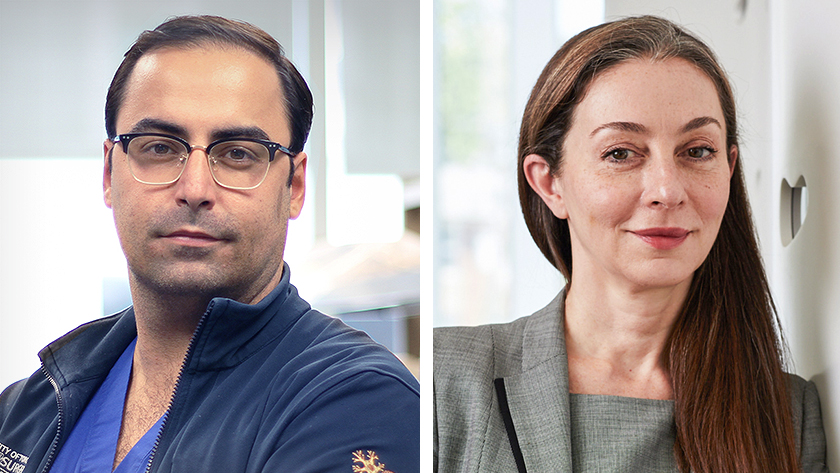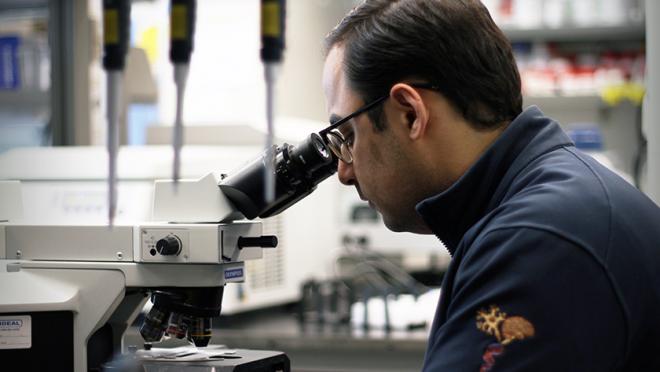
UHN neurosurgeons Drs. Farshad Nassiri and Gelareh Zadeh published the results of the Phase 1/2 clinical trial that show that a novel therapy for recurrent glioblastoma is well-tolerated and prolongs patient survival.
Glioblastoma is a notoriously difficult-to-treat primary brain cancer. Despite aggressive treatment, which typically involves surgical removal of the tumour and multiple chemotherapy drugs, the cancer often returns.
Once tumours recur, treatment options are scarce. To meet the urgent need for new treatments, Dr. Zadeh and her colleagues evaluated an innovative therapy in 49 patients with recurrent disease from 15 hospital sites across North America. UHN was the only Canadian institution and treated most of the patients enrolled in the trial.
The novel therapy involves the combination of an oncolytic virus—a virus that has been engineered to selectively infect and kill cancer cells—and type of a targeted immunotherapy called immune checkpoint inhibition.
First, the team slowly injected the virus directly into the tumour using stereotactic techniques. Patients then received a common immune checkpoint inhibitor intravenously once every three weeks, starting one week after surgery.
Immune checkpoint inhibitors are effective treatments for a variety of cancers, but they have had limited success in treating recurrent glioblastoma.
“These drugs work by preventing cancer’s ability to evade the body’s natural immune response, so they have little benefit when the tumour is immunologically inactive, as is the case in glioblastoma,” explains Dr. Zadeh, Co-Director of the Krembil Brain Institute and Senior Scientist at the Princess Margaret Cancer Centre. “Oncolytic viruses can overcome this limitation by creating a more favourable tumour microenvironment, which then helps to boost anti-tumour immune responses.”
The combination of these viruses and immune-checkpoint inhibitors results in a “double hit” to tumours: the virus directly kills cancer cells and stimulates local immune activity that makes the cancer cells more vulnerable to targeted immunotherapy.
The results, published in Nature Medicine, show that the novel combination therapy is well tolerated and prolongs patient survival. The therapy had no major unexpected adverse effects and yielded a median survival of 12.5 months—considerably longer than the 6 to 8 months typically seen with existing therapies.
“We’re very encouraged by these results,” says the first author of the study, Dr. Farshad Nassiri, a senior neurosurgery resident at the University of Toronto. “Over half of our patients achieved a clinical benefit—stable disease or better—and we saw some remarkable responses, with tumours shrinking and some even disappearing completely. Three patients remain alive at 45, 48 and 60 months after starting the clinical trial.”

Dr. Farshad Nassiri examining tumour samples in the Zadeh lab.
“The findings of the study are particularly meaningful as the patients did not have tumour resection at recurrence—only injection of the virus—which is a novel treatment approach for glioblastoma,” adds Dr. Zadeh, who is also a Professor at the Department of Surgery at the University of Toronto and holds the Dan Family Chair in Neurosurgery and the Wilkins Family Chair in Neurological Brain Tumour Research.
“We believe the key to our success was delivering the virus directly into the tumour prior to using systemic immunotherapy. Our results clearly signal that this can be a safe and effective approach,” says Dr. Nassiri.
The researchers also performed experiments to define mutations, gene expression and immune features of each patient’s tumour. They discovered key immune features that could eventually help clinicians predict treatment responses and understand the mechanisms of glioblastoma resistance – the first study of its kind for brain tumors.
“In general, the drugs that are used in cancer treatment do not work for every patient, but we believe there is a subpopulation of glioblastoma patients that will respond well to this treatment,” says Dr. Zadeh. “I believe this translational work, combining basic bench science and clinical trials, is the key to moving personalized treatments for glioblastoma forward.”
The next steps for the group are to test the effectiveness of the combination therapy against other treatments in a randomized clinical trial.
This is one of the few clinical trials with promising results for glioblastoma over the last decade, and it was truly a team effort.
“The trial would not have been possible without our incredible OR teams, research safety teams and researchers—including Dr. Warren Mason at Princess Margaret Cancer Centre—and our brave patients and their families. We’re also grateful to the Wilkins Family for providing the funds to enable us to complete trials that advance care for our patients,” says Dr. Zadeh.
Click here for a video of Drs. Zadeh and Nassiri discussing the trial.
This work was supported by DNATrix Inc., Merck & Co. Inc., the Princess Margaret Cancer Centre Foundation and the UHN Foundation. Dr. Gelareh Zadeh is a Professor at the Department of Surgery at the University of Toronto and holds the Dan Family Chair in Neurosurgery and the Wilkins Family Chair in Neurological Brain Tumour Research.
Nassiri F, Patil V, Yefet LS, Singh O, Liu J, Dang RMA, Yamaguchi TN, Daras M, Cloughesy TF, Colman H, Kumthekar PU, Chen CC, Aiken R, Groves MD, Ong SS, Ramakrishna R, Vogelbaum MA, Khagi S, Kaley T, Melear JM, Peereboom DM, Rodriguez A, Yankelevich M, Nair SG, Puduvalli VK, Aldape K, Gao A, López-Janeiro A, de Andrea CE, Alonso MM, Boutros P, Robbins J, Mason WP, Sonabend AM, Stupp R, Fueyo J, Gomez-Manzano C, Lang FF, Zadeh G. Oncolytic DNX-2401 virotherapy plus pembrolizumab in recurrent glioblastoma: a phase 1/2 trial. Nat Med. 2023, May 15. doi: 10.1038/s41591-023-02347-y.




